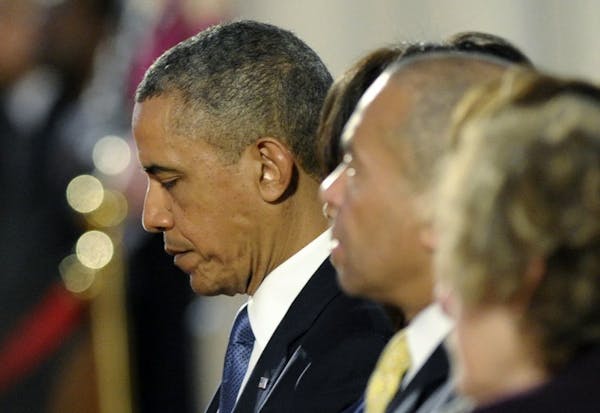On Thursday afternoon, the FBI released photos and video of two persons of interest in the Boston Marathon bombing. Surveillance cameras turned out to be their undoing.
We should see this as a sign of the virtues of video surveillance. More than that, we should think about how cameras could help prevent crimes, not just solve them.
Cities under threat of terrorist attack should install networks of cameras to monitor everything that happens at vulnerable urban installations. Yes, you don't like to be watched. Neither do I.
But of all the measures we might consider to improve security in an age of terrorism, installing surveillance cameras everywhere may be the best choice. They're cheap, less intrusive than many physical security systems, and they can be extremely effective.
The idea of submitting to constant monitoring feels nearly un-American to most of us. In addition to normalizing surveillance — turning every public place into a venue for criminal investigation — there's also the potential for abuse.
Once a city is routinely surveilled, the government can turn every indiscretion into a criminal matter. You used to be able to speed down the street when you were in a hurry. Now, in many places around the world, a speed camera will send you a ticket in the mail.
Combine cameras with facial-recognition technology, and you've got a recipe for governmental intrusion. Did you just roll a joint or jaywalk or spray-paint a bus stop? Do you owe taxes or child support? Well, prepare to be investigated — if not hassled, fined or arrested.
But abuses and slippery-slope fears could be contained by regulations that circumscribe how the government can use footage. In the aftermath of 9/11, we've turned most public spaces into fortresses — now, it's impossible to get into tall buildings, airports, concerts, and even public celebrations without being subjected to pat-downs and metal detectors.
This won't be the first time we've caught terrorists with surveillance cameras. It happened in London, the world's most-surveilled city, almost a decade ago. When a team of suicide bombers attacked the city's transportation systems on July 7, 2005, officials relied primarily on closed-circuit television cameras to identify the attackers in a few days' time.
There's ample evidence that CCTVs combat more routine crime. After cameras were installed in downtown Baltimore in 2005, the study says, violent crime fell by 23 percent and all crime fell by 25 percent. In one area of Chicago, crime fell by 38 percent after CCTVs were installed.
The study showed a smaller impact in other places — in Washington, D.C., for instance, researchers found that a surveillance system had no discernible impact on crime. But the reason for D.C.'s surveillance failure won't please civil libertarians: Researchers argued that the cameras likely didn't work because their use was too tightly regulated as a result of privacy fears. The report suggests that if the rules were relaxed, the cameras might prove far more effective.
The next step in surveillance technology involves artificial intelligence. Several companies are working on software that monitors security-camera images in an effort to spot criminal activity before it happens.
One company, BRS Labs, has built technology for the San Francisco public transportation system that will monitor scenes and alert officials when it spots "unusual or abnormal behavior." The software looks for any statistically unusual occurrences.
By monitoring a scene for a long time, it determines what's "normal" for that environment. It then alerts officials when something strays from normalcy — people who are loitering instead of getting about their business, people who are jumping turnstiles, and folks who drop a package and then walk away.
The best reason to welcome a government network of surveillance cameras is that we're already being watched — just not in a way that aids law enforcement. Private security cameras dot every busy street, and personal cameras are everywhere. It might have been valuable, at some point, for us to have a discussion about whether we wanted cameras everywhere.
But we missed that moment — instead, you and I and everyone we know went out and bought smartphones and began snapping photos incessantly. Nowadays, when anything big goes down, we all willingly cede our right to privacy — we take it for granted that photos provide valuable insight into news events, and we flood the Web with pictures of the scene of big news.
Cameras helped the FBI find persons of interest in the marathon bombing. But could they have done more?
I can't tell you if the marathon bombing would have been prevented if Boston had a larger network of cameras being monitored by software or human operators. It's certainly possible that if the cops were watching the scene in real time from 100 different angles, they might have missed something.
But at least they would have had a chance to see something. That's better than staying in the dark.

The little park that could … be better
Climate change looms large this election year
For this Minnesota legislator, action targeting child abuse is intensely personal


